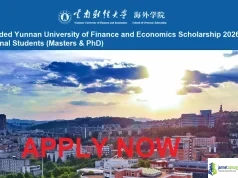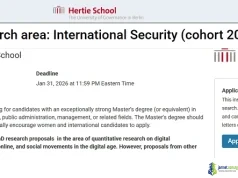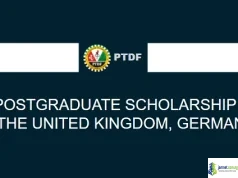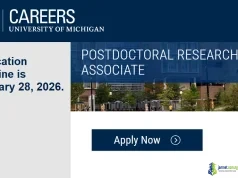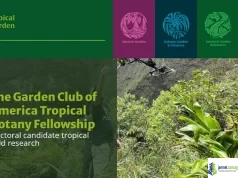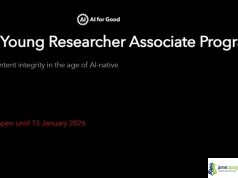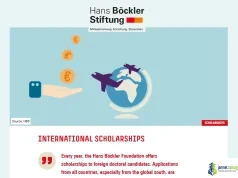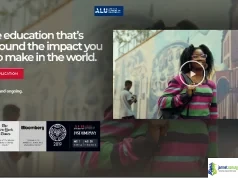Applications are now open for the Fully Funded Université Laval/Max Planck PhD Scholarships 2026 on China’s Science Silk Road. Deadline is November 14, 2025.


Université Laval’s Department of Political Science, in partnership with the Max Planck Institute for the History of Science (MPIWG) in Berlin, is inviting applications for two prestigious PhD scholarships funded by the Volkswagen Foundation. Starting in September 2026, these fully funded positions will provide early-career researchers with the opportunity to investigate one of the most significant developments in contemporary global science policy: China’s “Science Silk Road.

Join our Telegram Channel for Instant Scholarship Updates
Planning your PhD abroad, especially for such a complex, interdisciplinary topic, requires strong financial footing. While this is a fully funded opportunity, always keep resources like the guide to student loans for international students in mind for emergency planning. For those relocating to Quebec City, our best student accommodation tips can help you settle quickly. This program represents a high-value path for those determined to how to win a fully-funded scholarship at the doctoral level.
Scholarship Overview Summary: China’s Science Silk Road PhD
| Detail | Description |
|---|---|
| Host Institution | Université Laval (Canada) Max Planck Institute (Germany) |
| Study Abroad | Study in Canada & Germany (Fieldwork/Affiliation) |
| Category | PhD Scholarships Political Science/STS |
| Funding Source | Volkswagen Foundation |
| Reward | Fully Funded Stipend of C$40,000 per year |
| Duration | 4 years (subject to satisfactory progress) |
| Deadline | November 14, 2025 |
The Science Silk Road, part of the Belt and Road Initiative (BRI), is an ambitious program designed to expand investment in science, technology, and innovation globally. This opportunity is an outstanding choice for those reviewing the ten reasons to study your Masters abroad and deciding on their future. It offers superior benefits compared to seeking funding from general affordable US universities or pursuing other international avenues.
Key Advantages of the PhD Scholarship
The primary advantage is the focus on one of the most critical and under-researched areas of global governance, providing a platform for highly influential academic work. This interdisciplinary research will engage with international relations, the sociology of science, science and technology studies (STS), anthropology, and geography.
The key advantages include:
- Pioneering Research: One of the first in-depth analyses of the Science Silk Road, examining its components and assessing its impacts on scientific knowledge production.
- Generous Funding: A highly competitive stipend valued at approximately C$40,000 per year for four years, covering full tuition fees and providing a substantial living allowance.
- International Mobility: Dedicated funds support fieldwork, training, and conference participation, including a research stay at MPIWG in Berlin and an opportunity to attend a PhD course at the University of Oslo.
This global exposure significantly enhances career prospects after the PhD, particularly for seeking a post-graduation work permit (PGWP). The dual-institution training model ensures unparalleled mentorship, differing significantly from single-university programs as detailed in fully funded program comparisons. This decision requires careful thought, so reviewing our questions to help you decide if studying abroad is right for you is highly recommended.
Supervision and Training
Successful candidates will be co-supervised by Professor Hang Zhou and Professor Jean-Frédéric Morin at Université Laval, with additional mentorship from Professor Han Cheng and Professor Anna Lisa Ahlers at MPIWG.
While based in the Department of Political Science at Université Laval, students will also be affiliated with the Graduate School of International Studies and the Interdisciplinary Centre for Research on Global Governance (CIRGoM). This robust structure offers high-quality supervision and mentorship, ensuring a rich academic and professional experience.
Eligibility Criteria & Candidate Profile
Candidates of all nationalities are welcome to apply. Applicants should hold, or expect to obtain by the end of the 2025–26 academic year, a Master’s degree with Merit or Distinction in political science, international relations, sociology, anthropology, geography, or a related discipline. The best way to secure this funding is to learn how to apply for scholarships successfully by focusing on the project’s unique demands. Your application should emphasize the top qualities of scholarship winners, demonstrating intellectual curiosity and collaborative spirit. Even if you have a history of having to explain low GPA in personal statements, a superior research proposal can overcome this.
Academic Requirements and Preparation
Applicants should demonstrate a strong interest in topics such as science diplomacy, science policy, STS, global governance of science, or international scientific cooperation. Familiarity with the Belt and Road Initiative or Global China Studies is an advantage, but not a requirement.
- Language: Fluency in English or French is required, with at least a working knowledge of the other.
- Focus: Students may choose a global (mixed methods, including data analysis) or regional focus (qualitative methods, ideally ethnographic fieldwork in Africa or Latin America).
For the rigorous demands of this research, we recommend time management techniques, such as the Pomodoro Technique for focused writing sessions. When preparing for the comprehensive nature of the project, structured learning strategies like the interleaving study technique can prove invaluable. Additionally, mastering detailed information organization using the Cornell method study hack will be essential.
Application Process: Step-by-Step Guide
Interested candidates should submit the required documents by email to Professor Han Cheng. This initial submission is followed by a formal application through Université Laval for shortlisted candidates.
Document Submission for a Winning Application
Your application documents must clearly articulate your research potential and the fit between your background and the Science Silk Road project.
- Cover Letter: A one-page letter outlining motivations and relevant training. Consult our comprehensive guide on why I deserve this scholarship essay to structure your narrative effectively.
- Research Proposal: A crucial three-page proposal including research questions, theoretical framework, methodology, and references. This requires the same persuasive polish found in successful scholarship essays; learn how to write a winning scholarship essay to make your proposal stand out.
- Academic CV & Transcripts.
For your CV, ensure you list strong academic referees. Reviewing tips on how to ask for a recommendation letter will help you manage this professional correspondence effectively. Check if any standardized tests like the GRE are needed for the formal university application later by reviewing our guide on do you require the GRE to study abroad? The quality of your submission must be as polished as a successful Chevening scholarship essay that wins.
Application Deadline: November 14, 2025.
CLICK HERE TO APPLY
For more information click HERE
The deadline for the initial application submission (via email) is November 14, 2025. All required documents must be sent by email to Professor Han Cheng at hacheng@mpiwg-berlin.mpg.de by this date. Shortlisted candidates will later be invited to complete a formal application through Université Laval’s admissions system.
Frequently Asked Questions (FAQ)
- 1. What is the funding source for these scholarships?
- The two PhD scholarships are fully funded by the Volkswagen Foundation, a major German foundation supporting science and research.
- 2. How many scholarships are available?
- There are two fully funded PhD scholarships available under this project, focusing on China’s Science Silk Road.
- 3. What is the annual stipend amount?
- Each scholarship provides a highly competitive annual stipend of approximately C$40,000 per year.
- 4. What is the start date for the program?
- The fully funded PhD positions are expected to start in September 2026.
- 5. What are the two main institutions involved in the project?
- The project is a partnership between Université Laval’s Department of Political Science in Canada and the Max Planck Institute for the History of Science (MPIWG) in Berlin, Germany.
- 6. What research method is preferred for a regional focus?
- A regional focus should emphasize qualitative methods, ideally with experience in ethnographic fieldwork in regions like Africa or Latin America.
- 7. What is the minimum academic requirement to apply?
- Applicants must hold, or expect to obtain, a Master’s degree with Merit or Distinction in a relevant social science discipline by the end of the 2025–26 academic year.
- 8. Who should the application documents be sent to initially?
- The application documents must be submitted initially by email to Professor Han Cheng at hacheng@mpiwg-berlin.mpg.de.
- 9. What is the length requirement for the research proposal?
- The research proposal must be three pages long, including research questions, theoretical framework, methodology, and references.
- 10. Do I need to know both English and French to apply?
- Fluency in either English or French is required, and candidates should have at least a working knowledge of the other language for this joint Canadian/international project.

